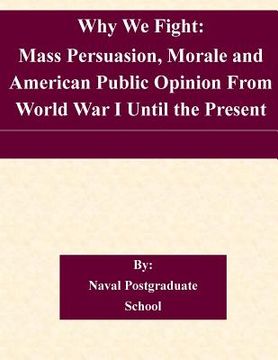Why We Fight: Mass Persuasion, Morale and American Public Opinion From World War I Until the Present (in English)
Synopsis "Why We Fight: Mass Persuasion, Morale and American Public Opinion From World War I Until the Present (in English)"
This book examines the role of US mass persuasion during modern war and the effects of propaganda, strategic narrative, military strategy, and policy on morale and public opinion. Through historical analysis of several phases of US war propaganda, from the world wars to the Global War on Terror, this book aims to understand the political essence and the cultural and functional nuance of propaganda in a wartime democracy.Prevailing wisdom holds that the United States managed a coherent, focused, and intelligently wielded campaign of mass persuasion in Europe, 1941-1989. Yet, American strategic mass persuasion efforts since 2001 have consistently failed to persuade friend and foe of the strategic efficacy of American and allied campaigns. This book finds that wartime propaganda has little effect if it is not derived from a concrete overall strategy, policy, and narrative. The most impactful uses of mass persuasion rely on a perpetual rebalancing of military theorist Carl von Clausewitz paradoxical trinity violence, chance, and policy, anchored in democratic statecraft and the virtues of pluralism. Therefore, to better facilitate balancing, an independent governmental agency charged with information management during war may better serve the public, policy makers and the military, producing the desired political ends.

